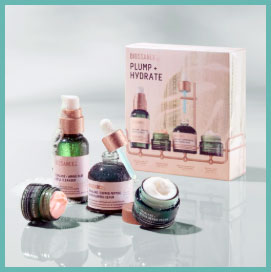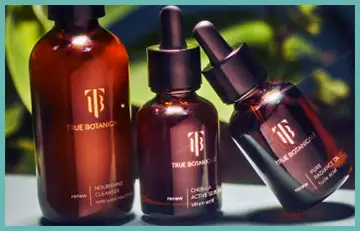I’m no skincare expert, but I’ve spent years experimenting with products to find what truly works for my sensitive, sometimes breakout-prone skin.
When it comes to clean beauty, Biossance and True Botanicals stand out as heavyweights. Both brands promise high-quality, sustainable ingredients and impressive results, but which one delivers the glow-up you’re chasing?
In this article, I’ll share my firsthand experience with both, breaking down their pros, cons, and key features to help you decide which deserves a spot in your routine.
Comparison Table: Biossance Vs. True Botanicals
| Feature/Product | Biossance | True Botanicals |
| Signature Ingredient | Sugarcane-derived squalane | Chebula, botanical oils |
| Price Range | $20–$74 | $28–$190 |
| Target Audience | Broad, sensitive skin focus | Anti-aging, sensitive skin |
| Certifications | My Green Lab, cruelty-free | MADE SAFE, cruelty-free |
| Key Products | Squalane + Vitamin C Rose Oil, Marine Algae Eye Cream | Pure Radiance Oil, Chebula Serum |
| Sustainability | Recyclable packaging, CarbonFund partnership | Sustainably sourced, eco-conscious |
| Availability | Sephora, Amazon, Biossance.com | TrueBotanicals.com, select retailers |
My Skincare Journey And Why These Brands Matter
I’ve always been picky about what I put on my face. After a bad reaction to a drugstore cleanser in my teens, I swore off anything that didn’t prioritize clean, non-irritating ingredients. That’s how I stumbled across Biossance and True Botanicals, two brands that dominate the clean beauty conversation. Both have cult followings, celebrity endorsements, and a focus on sustainability, but they’re not carbon copies of each other. My goal? To figure out which one’s worth my hard-earned cash—and yours—by testing their star products and weighing what makes them shine (or not).
Biossance: The Squalane Superstar

Biossance caught my eye with its sugarcane-derived squalane, a lightweight, non-comedogenic oil that mimics your skin’s natural moisture. Founded in 2016, the brand’s built a reputation for clean, sustainable skincare that’s accessible at places like Sephora and Amazon. Their products are dermatologist-approved, vegan, and cruelty-free, with packaging that’s fully recyclable. Plus, they’ve got a partnership with CarbonFund.org to offset their environmental impact. Sounds promising, right? Let’s break down what I loved and what didn’t quite hit the mark.
Pros of Biossance
- Hydration Hero: Squalane is the star here, and it’s a game-changer for keeping skin soft without clogging pores. I tried the Squalane + Vitamin C Rose Oil, and it left my skin dewy without that greasy feel. It’s like giving your face a tall glass of water.
- Affordable Luxury: Compared to True Botanicals, Biossance is easier on the wallet. Their cleansers start at $20, and even their priciest serums top out at $74. You get high-quality formulas without needing a second job.
- Sensitive Skin Friendly: Their products skip synthetic fragrances and over 2,000 toxic ingredients. My sensitive skin didn’t flare up once, even with daily use of their Amino Aloe Gentle Cleanser.
- Wide Range: From sunscreens to lip balms, Biossance covers all bases. Their Squalane + Zinc Sheer Mineral Sunscreen SPF 30 was a summer staple for me, though it left a slight dewy finish.
- Accessibility: You can grab Biossance at Sephora, Amazon, or their website. No hunting required, which is a win for convenience.
Cons of Biossance
- Not Fully Natural: While marketed as clean, Biossance isn’t 100% organic or natural. Some products, like their Lactic Acid Resurfacing Night Serum, use synthetic preservatives like phenoxyethanol, which raised my eyebrows.
- Mixed Efficacy: The Marine Algae Eye Cream felt like an overpriced moisturizer to me. At $54, I expected more than just hydration—no major reduction in my dark circles.
- Dewy Overload: If you’re not into a shiny finish, products like the sunscreen might feel too oily, especially for combination skin like mine.
- Limited Wow Factor: Some products, like the BHA Pore Minimizing Toner, were just okay. They hydrated but didn’t transform my skin the way I hoped.
True Botanicals: The Luxe Botanical Powerhouse

True Botanicals entered my radar through Instagram, with celebs like Olivia Wilde and Laura Dern raving about it. Founded by Hillary Peterson after her thyroid cancer diagnosis, the brand blends science and nature with a focus on anti-aging and sustainability. Their products are MADE SAFE certified, vegan, and cruelty-free, with ingredients like chebula and botanical oils sourced responsibly. But with prices reaching $190, I wondered if the hype was worth it. Here’s what stood out during my trial.
Pros of True Botanicals
- Potent Ingredients: Chebula, an Ayurvedic antioxidant, is their secret weapon. The Chebula Active Serum made my skin feel smoother after just two weeks, and the texture improvement was undeniable.
- Luxurious Experience: The packaging—think weighty amber glass bottles—feels like a spa treatment. The Pure Radiance Oil’s subtle citrus scent turned my nighttime routine into a ritual.
- Anti-Aging Results: The Phyto-Retinol Advanced Clinical Cream tackled my fine lines better than any retinol I’ve tried, without irritation. My skin looked plumper after a month.
- Sustainability Focus: True Botanicals traces every ingredient to its source, ensuring eco-friendly cultivation. This transparency gave me confidence in their ethos.
- Customizable: Their skin quiz matches products to your needs. It recommended the Renew Collection for my uneven texture, and the results were spot-on.
Cons of True Botanicals
- Pricey Investment: At $110 for the Pure Radiance Oil and $190 for some serums, this brand is a splurge. I winced at the checkout, even if the quality justified it.
- Limited Accessibility: You’re mostly stuck ordering from their website or select retailers. No Sephora runs here, which can be a hassle.
- Scent Sensitivity: The citrusy notes in some products, like the Renew Repair Serum, might be too strong for sensitive noses. I loved it, but my sister found it overpowering.
- Niche Focus: True Botanicals leans heavily into anti-aging and sensitive skin. If you’re dealing with acne or oily skin, their Clear Collection might not cut it compared to Biossance’s broader range.
Read More: My Thoughts On Yehwadam Vs. Sulwhasoo
Head-To-Head: Key Features And Performance
Let’s get into the nitty-gritty of how these brands stack up across key areas. I tested their flagship products—Biossance’s Squalane + Vitamin C Rose Oil and True Botanicals’ Pure Radiance Oil—alongside other staples like cleansers and serums. Here’s what I found.
Ingredients and Formulas
Biossance’s squalane is a lightweight, hydrating oil that’s in nearly every product. It’s derived from sugarcane, making it sustainable and non-comedogenic. Their Vitamin C Rose Oil blends squalane with tetrahexyldecyl ascorbate (a stable vitamin C) to brighten and firm. I noticed a subtle glow after a week, but the results plateaued. Their Marine Algae Eye Cream uses pink marine algae and paracress extract, promising to lift and hydrate, but it didn’t do much for my puffiness.
True Botanicals, on the other hand, leans into bioactive botanicals like chebula, green tea, and chia seed oil. Their Pure Radiance Oil (from the Renew Collection) combines omega-rich oils with antioxidants to hydrate and smooth. After a month, my skin felt softer and looked more even-toned. The Chebula Active Serum, with its Ayurvedic star ingredient, tackled roughness better than Biossance’s serums. However, some formulas, like their eye serum, felt too oily for daytime use.
Price and Value
Biossance is the budget-friendly option, with most products under $60. The Squalane + Vitamin C Rose Oil ($74) lasts months since you only need a few drops. Their Amino Aloe Gentle Cleanser ($24) is a steal for how well it removes makeup without stripping my skin.
True Botanicals is a luxury commitment. The Pure Radi 1000 ance Oil ($110) and Chebula Active Serum ($90) are pricier, but their concentrated formulas mean a little goes a long way. I used the oil for three months and barely made a dent. Still, the high cost makes it less accessible for daily use unless you’re ready to splurge.
Sustainability and Ethics
Both brands prioritize sustainability, but they approach it differently. Biossance’s My Green Lab certification and recyclable packaging are impressive, and their CarbonFund partnership offsets emissions. True Botanicals goes deeper, tracing every ingredient to ensure ethical sourcing and minimal environmental impact. Their MADE SAFE certification is a gold standard, banning over 6,500 harmful chemicals. If eco-consciousness is your top priority, True Botanicals edges out slightly.
Accessibility and Convenience
Biossance wins for convenience. I could pop into Sephora to test products or order from Amazon with next-day delivery. True Botanicals’ direct-to-consumer model means you’re mostly ordering online, which can delay gratification. Their skin quiz is a nice touch, but I missed the in-store experience.
Skin Type Suitability
Biossance casts a wide net, with products for sensitive, oily, dry, and combination skin. Their Squalane + Tea Tree Balancing Oil was a lifesaver during a breakout phase, calming redness without drying me out. True Botanicals, while versatile, shines for anti-aging and sensitive skin. Their Renew Collection worked wonders for my fine lines but wasn’t as effective for occasional acne compared to Biossance’s targeted options.
My Experience: A Month With Each Brand
To give both brands a fair shot, I used Biossance for a month, then switched to True Botanicals. Here’s how it went.
Biossance: The Everyday Staple
I started with the Amino Aloe Gentle Cleanser, which felt like a hug for my skin. It removed sunscreen and makeup effortlessly, leaving my face soft but not tight. The Squalane + Vitamin C Rose Oil was next, and I loved how it sank in quickly. I mixed a drop with my moisturizer for a dewy glow under makeup. The Marine Algae Eye Cream, though, was a letdown—hydrating but no match for my stubborn dark circles. The Omega Repair Cream felt rich but had a faint scent I wasn’t crazy about. Overall, Biossance was reliable and easy to incorporate into my routine, especially for hydration.
True Botanicals: The Luxe Ritual
Switching to True Botanicals felt like upgrading to first class. The Renew Nourishing Cleanser had a silky texture that made cleansing a treat. The Pure Radiance Oil was my favorite—two drops at night left my skin glowing by morning. The Chebula Active Serum tackled texture issues I didn’t even know I had, smoothing my forehead noticeably. The Resurrection Eye Cream was a standout, reducing puffiness better than Biossance’s offering. My only gripe? The price made me ration products like they were liquid gold.
Which Brand Wins For Me?
After testing both, I lean toward True Botanicals for its transformative results and luxurious feel. The Chebula Active Serum and Pure Radiance Oil gave my skin a radiance Biossance couldn’t match. That said, Biossance’s affordability and accessibility make it a strong contender, especially for sensitive or acne-prone skin. If you’re on a budget or want a one-stop-shop, Biossance is your pick. If you’re after anti-aging power and don’t mind splurging, True Botanicals is the way to go.
Read More: My Thoughts On Sulwhasoo vs. Shiseido
Frequently Asked Questions (FAQ)
Yes, Biossance is solid for hydration and sensitive skin, with effective, clean formulas. But some products, like their eye cream, feel overpriced for the results.
Absolutely. True Botanicals delivers on anti-aging and sustainability, with potent ingredients like chebula. The high price is the main drawback.
While Jessica Chastain hasn’t publicly confirmed using True Botanicals, celebs like Olivia Wilde and Laura Dern have endorsed the brand, suggesting it’s a Hollywood favorite.
Yes, Biossance is dermatologist-approved, with products tested for safety and efficacy, making them a trusted choice for sensitive skin.
Conclusion: Your Skin, Your Choice
You’ve got two stellar options here, but it all comes down to what you need. Biossance offers affordable, accessible hydration with a broad range for all skin types. True Botanicals brings luxe, anti-aging power with a sustainability edge, but it’s a bigger investment. I loved the glow True Botanicals gave me, but Biossance’s versatility kept it in my rotation. Try a few products from each to see what vibes with your skin—you can’t go wrong with either.
